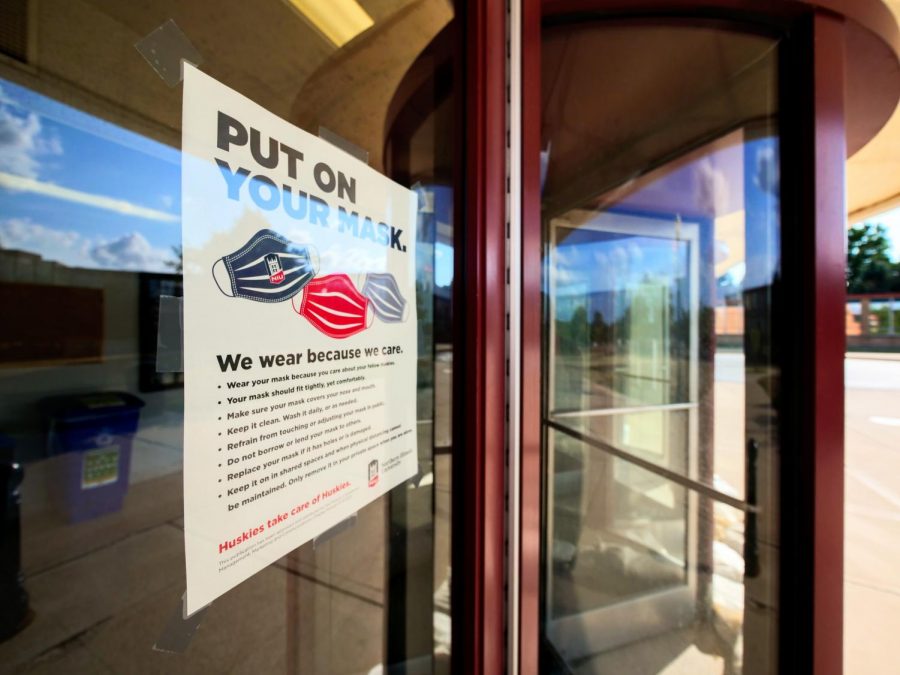NIU announces 2-week ban on in-person undergrad classes, student gatherings
September 11, 2020
DeKALB — Undergraduate courses have been moved online temporarily, until Sept. 28, according to a Friday email from NIU President Lisa Freeman.
Faculty are allowed to submit requests for in-person class exceptions, and students can check Blackboard at noon Sunday to see if their class has been given that exception.
NIU spokesperson Joe King said graduate programs and the law school are unaffected by this announcement.
Students on campus are being asked to stay in their residence halls as much as possible until Sept. 28, according to the email.
Those who live off-campus are asked to stay in their respective areas and limit social interactions to necessary contact.
Gatherings of any kind, on or off campus, are prohibited. This includes inside residence halls and Greek organizations off campus, according to the email.
Parking restrictions have been increased. Parking permits are required in the designated lots 24/7. Guests of students are prohibited on any part of campus.
The university will continue to do surveillance testing and students must attend their scheduled test time, according to the email.
Students who fail to comply with this announcement will receive disciplinary measures that can range from written warnings and loss of university privileges to semester-long suspensions or permanent removal from the university, according to the email.
Students who are isolating should continue to follow the guidelines of the DeKalb and state health departments and those who experience symptoms or are positive must report their symptoms to the NIU Helpline (815-753-0444), according to the email.
All in-person events have been canceled until Sept. 28. Virtual events will still happen as planned.
“The actions we’re taking might seem harsh and too challenging, but they are precedented by other universities and provide students and NIU the necessary time and precautions to be able to prevent an outbreak” Freeman wrote in the email.
Freeman said they will provide a status update prior to Sept. 28.
SGA President Antonio Johnson said he applauds the university’s response on behalf of the NIU community to keep them safe. Johnson said he thinks this is best for students.
“My advice to students is to just take it one day at a time and allow updates to come out,” Johnson said.
SGA Speaker of the Senate Brad Beyer said students who’ve been compliant about the Protect the Pack plan should keep up the practices they’ve been mandated to do since the start of the school year.
He said this is an opportunity for students to understand that their actions now impact the future of the semester.
“The leadership are certainly doing their part,” Beyer said. “[Students and administration] are equal partners in this.”
Staff also received a message from Freeman stressing the importance of coming together to protect the students.
“I’m reminded on this 19th anniversary of the tragic events of Sept. 11, 2001, that when we come together to address a crisis and make caring for others a priority, we are at our strongest,” Freeman wrote.
Staff is being urged to shift away from any in-person services and focus on virtual interaction.
All of these actions are being taken to lower positive rates, according to the email.
This update comes after the Illinois Department of Public Health announced Friday that DeKalb County is at a warning level of Coronavirus Disease, along with 29 other counties, according to an Illinois Department of Public Health Friday news release. A warning level is issued when two or more of the following criteria are met:
• If there are more than 50 new cases per 100,000 people in the county, this triggers a warning.
• When the weekly number of deaths increases more than 20% for two consecutive weeks.
• When the 7-day test positivity rate rises above 8%.
•If there are fewer than 20% of intensive care units available in the region, this triggers a warning.
• When the weekly percent of COVID-19-like-illness emergency department visits increase by more than 20% for two consecutive weeks.
• When the weekly number of hospital admissions for COVID-19-like-illness increases by more than 20% for two consecutive weeks.
•This metric is used to provide context and indicate if more testing is needed in the county.
• This metric looks at the percent of COVID-19 cases associated with clusters or outbreaks and is used to understand large increase in cases.







